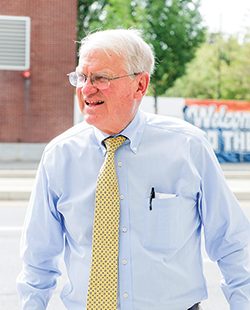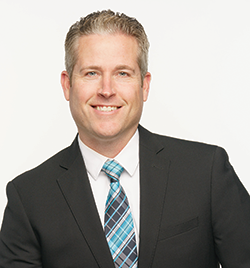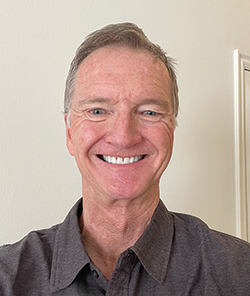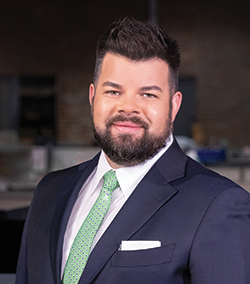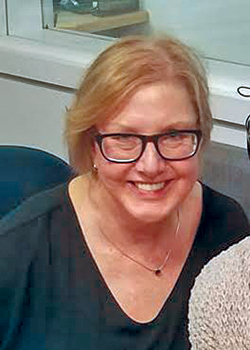All Eyes on the Lege Guys
What members of the media are watching out for in this session of the Utah Legislature.
By Benjamin Wood @BjaminWoodAssuming that insurrectionists have not overthrown the government—at press time, American democracy was ostensibly intact—Utah lawmakers will have come together this week to launch the 2021 legislative session, a 45-day marathon of parley, pontificating and posturing on laws that will impact every man, woman and child in The Beehive State.
Much has changed since the Legislature convened in 2020. For starters, the ongoing coronavirus pandemic and potential for violent demonstrations have motivated state leaders to indefinitely seal the Capitol. Members of the public who wish to follow the proceedings must do so remotely, and online. Here's hoping the frequently temperamental live streams will be able to handle the weight.
The august chambers of the House and Senate are welcoming roughly a dozen fresh faces after 2020's election. And whatever legislation is passed will ultimately find itself on the desk and under the pen of a new governor, Spencer Cox.
But much remains the same. While Democrats expanded their House caucus by one seat, it's unlikely to impact the machinations of their Republican counterparts, who maintain a supermajority in both legislative chambers and control of the executive branch.
Perennial topics of debate will inevitably return—such as which taxes to cut, which taxes to raise and how to pay for the state's lowest-funded-in-the-nation public education system. And after a tumultuous year of protests, lockdowns, disease, widespread unemployment and the most divisive presidential election of modern times, lawmakers will be called on to confront an array of challenges faced by their constituents throughout the state.
And standing on the periphery of the action will be Utah's underpaid and overworked press corps, attempting to make some sense of the madness. Here, in their own words, are the questions and issues on their minds as they make their way up Capitol Hill—or more likely, as they boot up their laptops for long days of virtual politics.
—Benjamin Wood
Rod Decker: How will Gov. Spencer Cox stand up to the Republican Legislature?
Starting with Gov. Henry Blood in the Great Depression, Utah governors mostly got their way, but that began to change with Gov. Mike Leavitt (1993-2003). Legislators became more powerful because Republicans held permanent control, and lawmakers became careerists instead of amateurs. Almost every year now sees power shift from the governor to the Legislature.
Spencer Cox hopes to get his way by being nice. He says he will consult more with lawmakers and accede to their views early.
When Republicans cut Salt Lake City teachers out of a statewide bonus last month, Spencer Cox met privately with House Speaker Brad Wilson and worked out a deal so Salt Lake teachers shared the bonus after all.
Will Cox be able to talk similar sense to the Republicans on other issues during the session?
Rod Decker retired as a reporter from KUTV 2 in 2017. His latest book is Utah Politics: The Elephant in the Room.
Bryan Schott: Mirage money and voting maps
Lawmakers like to joke the only thing they need to do every year is pass the budget, and they could go home after that. There might be more truth to that this year. There's a real fear that a COVID outbreak might prompt them to stop the session early. That's the reason legislative leaders are putting so much money into the base budgets, which must pass in the first 10 days.
Lawmakers head into the session flush with cash, anticipating about $1 billion of new revenue. There's a fear that some of that money is a mirage, a "sugar high" effect from the coronavirus stimulus money pouring into the state. If Congress passes President-elect Joe Biden's stimulus package, which includes another round of direct payments, that will goose Utah's economy even further. Once the vaccine begins to take effect, Utah's economy is ready to roar.
This is a redistricting year. The seven members of the independent commission must be selected by Feb. 1. Gov. Spencer Cox gets to pick the chair of the commission. Majority leaders in the House and Senate get to pick two members, while the minority leaders also get to pick two. The remaining pair will be selected jointly by the majority and minority leaders. Later in the session, pay attention to which members of the Legislature are picked to sit on their committee to draw maps. The independent body and the legislative committee will work in parallel, but lawmakers don't have to follow their recommendations.
Bryan Schott is a political correspondent with The Salt Lake Tribune and host of the Tribune's Utah Politics with Bryan Schott podcast and The Rundown newsletter. Follow him on social media @SchottHappens and on Reddit at u/schottslc.
Katie McKellar: Cops, guns and money
Among the top issues I'll be paying attention to this year is police reform. There are already plenty of bills out there, like one sponsored by Rep. Angela Romero, D-Salt Lake City, that requires law enforcement agencies to keep track of their use of force in a federal database. Rep. Mark Wheatley, D-Salt Lake City, is behind a bill to allow cities to create police oversight boards in certain circumstances. And Rep. Andrew Stoddard, D-Sandy, has sponsored bill to expand reasons why a police officer's certification could be suspended or revoked. There's also a bill by Sen. Daniel Thatcher, R-West Valley City, requiring training and annual certification for law enforcement K-9s and their handlers. And one by Sen. Jani Iwamoto, D-Salt Lake City, designed to make sure police officers can't skirt an internal affairs investigation by bouncing to a different agency. The list goes on.
Also, guns. Guns will be a hot issue on Capitol Hill this year, starting with a bill from Rep. Walt Brooks, R-St. George, to do away with Utah's requirement for a conceal carry permit for legal gun owners over the age of 21. Plus, Rep. Cory Maloy, R-Lehi, is returning with his preemption firearm bill, which would declare the state has the final say on gun regulation, trumping cities and counties (Looking at you, Salt Lake County).
And, of course, I'll be watching all the other issues. Changes to the budget, what the Legislature decides to do with $80 million set aside for some sort of tax cut, whether they'll make any ground on the hefty topic of property tax equalization, pandemic response and if lawmakers make any changes that limit executive emergency powers, and whatever else gets heat.
As always, it's going to be a busy session. Are you as stressed out as I am yet?
Katie McKellar covers state government for the Deseret News. Follow her on Twitter @KatieMcKellar1
Glen Mills: Following the news of the day
ABC4 News is dedicated to keeping our viewers informed on what is happening daily at the state Capitol during the 2021 legislative session.
We will be keeping a close eye on how state lawmakers respond to the coronavirus pandemic, how they will fund education, health care, victim services and more.
This will also be a big year for redistricting that will extend beyond the general session. You can catch the latest every weeknight at 4, 5, 6 and 10 p.m.
Glen Mills is an anchor for ABC4. Find coverage on social media @abc4utah
Bob Bernick:
Double standards on coronavirus protocols
The GOP legislative majorities in the Utah House and Senate love to talk about "local control," meaning let the governments closest to the people make the decisions. That is unless it happens to be governments in Democratic-leaning Salt Lake City and County.
Watch for the GOP Capitol Hill bosses to deny $1,500 teacher bonuses to Salt Lake City School District teachers because the duly elected school board is sticking with the COVID-19 much-safer remote, virtual teaching. Senate President Stuart Adams, R-Layton, and House Speaker Brad Wilson, R-Kaysville, both say SLC teachers shouldn't get the bonuses unless in-class teaching starts now. What is good for the goose is not always good for the gander.
Bob Bernick is a longtime journalist and editor covering politics in Utah.
Ben Winslow: Never-ending 2020
A lot of the 2021 legislative session I expect will react to the events of 2020. I'll be watching bills dealing with COVID-19, the limits of executive branch power and the reach of health orders, policing and equity issues, etc.
There's also the annual bills dealing with Utah's medical marijuana program and alcohol policy that I'll be keeping tabs on.
Ben Winslow covers Utah Government for Fox 13. Follow him on Twitter @benwinslow
Taylor Anderson: Another gift to billboard companies
We've become so numb to a blight that clutters our beautiful city that the Legislature is intent on making the problem worse. Sen. Scott Sandall, R-Tremonton, wants to let the billboard companies change their massive advertisements from static images to digitally lit ones, stripping cities from all power to stop this added visual pollution.
As if the Legislature hadn't already done enough for these companies, SB61 would allow them to convert any billboard from static to digital and light the massive advertisements—which are often the size of small houses—around the clock except in certain cases. (Even then, cities could impose a curfew only from midnight to 6 a.m.)
Billboard companies have already received so much power from the Legislature, their products block new housing from being built and huge amounts of land from being used to the highest and best use of the public without giving taxpayers any say in the matter. Throughout our capital city, there are vacant corners next to transit, in established neighborhoods, even among new housing being constructed. That land could generate so much more for residents and city coffers. Why give these companies another gift?
Taylor W. Anderson is the editor of the Building Salt Lake website and co-founder of Sweet Streets SLC. Follow him on Twitter @TaylorWAnderson
Emily Means: Homelessness and police reform
I try to report on political issues through a social justice lens. With that in mind, this session I'm watching for bills on police and criminal justice reform. After this summer's protests against police brutality/racial injustice, I think there will be some legislative momentum around those issues.
Housing and homelessness are also on my radar. Unsheltered people have been more visible this past year (probably because congregate shelters aren't an ideal living situation, especially during a pandemic), and people have struggled to pay rent because of COVID's economic impacts. I'm watching for eviction policies and changes to the way the state handles homelessness.
KUER has restarted its politics podcast, 45 Days. We'll be doing a deep dive on some legislative topic every week. You can subscribe at 45days.org.
Emily Means reports on state politics for KUER. Follow her on Twitter @Em_Means13.
Katharine Biele: Voting, Board of Ed and gun rights
The country is jumping on the ranked-choice voting bandwagon. It looks like Utah is ready to make the leap, both because it's such an intuitive choice and also because the Republicans appear to be behind it. Voters, who like the idea, would just rank the candidates first choice to last. How hard is that? Under a pilot project, Vineyard and Payson both used RCV in the last election, and 83 percent of Utah County voters gave it a thumbs up. RCV has been used in primaries, too, most recently by the Democrats to elect Dr. Rosemary Lesser to fill the late Ogden Rep. LaWanna Shurtliff's spot in the Legislature. The present system allows a candidate to win with a plurality. In fact, our new U.S. Rep. Blake Moore won with only 31 percent of the vote. RCV gives candidates a majority mandate. Watch for Rep. Mike Winder's bill: https://le.utah.gov/~2021/bills/static/HB0127.html
The State Board of Education is a strange animal—few people understand it or have any idea who their representative is. And the way we elect this uber-board seems to change in head-spinning fashion. There was a time when the voters just up and elected their representatives. Then the selection went to the governor, who chose finalists to go back to the voters. Most recently, the predominately GOP state decided to make the election partisan. Now, Rep. Melissa Garff Ballard, R-North Salt Lake, may be bringing back a bill she pulled for voters to approve a constitutional amendment allowing the governor to appoint the board. The board itself doesn't like the idea. However, partisan elections have been controversial at best. Watch for Ballard's bill to come back: https://le.utah.gov/~2020/bills/static/HJR013.html
People have showing up with their honkin' big guns at the Utah Capitol, and it's nothing if not impressive. It's also intimidating as hell. Sen. Derek Kitchen, D-Salt Lake, wonders why, after the attempted insurrection in D.C., Utah would allow gun-toting constituents inside the building. "This isn't about responsible gun ownership, this is about making sure our officials aren't killed," he said. Now, just try convincing the rural conservatives. Rep. Cory Maloy, R-Lehi, is not about to let Kitchen trample his God-given Second Amendment right. No sir. He's pretty darned sure most gun owners are responsible. Never mind the few who want to maim and kill people they don't like. Watch for a bill from Kitchen. And don't get sidetracked with the targeted message that it's not the right time because we all have to heal and unite.
Katharine Biele is a longtime City Weekly columnist/reporter. Follow on Twitter at @kathybiele
Robert Gehrke: Online public participation in committee hearings
There's one thing we'll see this session that we've never really seen before, and that is online public participation in committee meetings, thanks to that nagging little virus. How that works out is something I'll be watching closely. Conceptually, it could be good, making it easier for more people to participate in the process without having to take a whole afternoon to visit the Capitol. And with two of the big issues I'm watching—homelessness and police reform, topics so many groups have been invested in for months—there will be no shortage of constituents wanting to offer their input. That's healthy.
The concern, however, is that so little of the lawmaking process happens in the public committee meetings. It's done in the hallways and chambers, usually face to face. The connected lobbyists will still have their say, as always. But what about the ordinary constituent? And that limited public access in the early days is one thing. What happens if we're still in this mostly virtual format at the end, when things are happening at a breakneck pace? Online participation gets a lot trickier.
Moral of the story:The public has an unprecedented opportunity to be involved in the committee hearings. That's good. But, as is the case in any session, it's going to take initiative and persistence if the public wants to help shape policy.
Robert Gehrke is a columnist and reporter covering government and politics for The Salt Lake Tribune.
Benjamin Wood: Is third time the charm for a new state flag?
Utah has a bad state flag. You could take my word for it, or you could judge it based on the generally accepted guidelines for good flag design, virtually all of which are violated by the overly cluttered banner that waves atop state buildings (and effectively nowhere else). In truth, the Beehive State doesn't really have a flag. It has a state seal, and at some point a decision was made to stamp that seal on a blue background, run it up a flag pole and call it a day.
That's regrettable, as good flags are community symbols that can inspire and unite. For proof of that, look no further than our neighboring states, most of which have exemplary flags that are proudly hung from homes and businesses and incorporated onto hats, shirts and other day-to-day areas of civic life.
Our Legislature has come achingly close to launching the search for a new, better design. In 2019, a bill to create a flag commission cleared the House but fell dead in the Senate. A similar bill fared worse in 2020, failing to make it out of an evenly split House committee.
Rep. Stephen Handy, R-Layton, and Sen. Dan McCay, R-Riverton, have brought back their bill for a third try. And while higher-priority legislation may very well suck up all the oxygen on the hill, our lawmakers should follow the lead of Provo and Salt Lake City and give us a flag we can be proud of.
Benjamin Wood is a freelance journalist covering the Legislature in partnership with City Weekly. Follow him on Twitter @bjaminwood.
More by Benjamin Wood
-
‘Festival street,' Green Loop and transit-oriented density anchor latest SLC plans for west downtown.
Arrested Development
- Apr 17, 2024
-
Former Salt Lake City mayor and celebrated Utah Democrat Ted Wilson dies at age 84.
Ted Led
- Apr 11, 2024
-
Salt Lakers are about to miss an opportunity for reconnection over and under I-15.
Small Lake City
- Mar 27, 2024
- More »
Latest in Cover Story
Readers also liked…
-
Forget the family pedigree—Robert F. Kennedy Jr should not be the next president of the United States
Trojan Horse
- Jun 21, 2023
-
Women decry harassment and toxic culture at St. George auto dealership
Men at Work
- Oct 11, 2023



